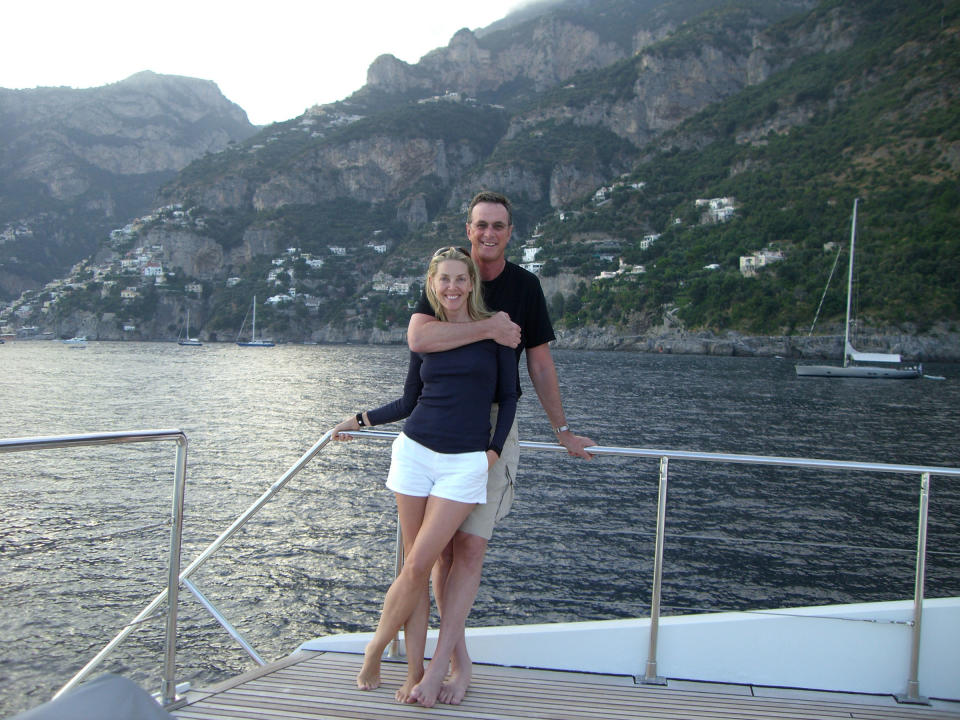How Michael Crichton and James Patterson Wrote Eruption

Michael Crichton, who died in 2008, left behind a passion project. Credit - Douglas Kirkland—Corbis/Getty Images
When Michael Crichton and his wife Sherri first started dating, all they did was hike. Every weekend there they were, taking in the scenery from the coasts of California to the mountains of Hawaii. The island of Kauai was their favorite place, its rivers carving through volcanic rock and steep, jagged cliffs cutting the sky. The couple would wake before dawn to be first ones out on the trails, and together they’d take in the sunrise.
Those miles were sacred—and one of the few times that Sherri could get a window into Michael’s writing process. It was the early 2000s, and Michael was already a literary phenomenon and bona fide screenwriting machine with novels and movie adaptations that made millions and spun franchises that continue today. Chief among them: Westworld, Twister, and Jurassic Park. At any given moment, he could be in the throes of research on multiple projects. But on those hikes with Sherri, he kept circling in on just one. “It was early in our relationship, when he said he had this book that was set in Hawaii and based on a volcano,” she remembers. “He would scratch his head—he was constantly working on it in his mind.”
Now, decades after its inception, that novel will arrive on June 3. Set on the Big Island, Eruption is an epic thriller about an impending volcanic eruption, and a government secret with potentially fatal implications. At the center of it all is John MacGregor, or Mac, a 30-something geologist who must lead a team of researchers through increasingly dangerous territory all while trying to save the lives of as many people as he can. It’s classic Crichton: a cinematic story rooted in science and infused with plenty of heart, tackling big themes like love and loss. But its journey to publication is unlike anything the author could have ever anticipated. In 2008, only three years into their marriage, Michael died of cancer while Sherri was pregnant with their son. Though the book that would become Eruption was the furthest thing from her mind at the time, Sherri knew she’d return to it one day. Eventually, she would enlist the help of another prolific author, James Patterson, to do so. But it would be more than a decade before she was ready to find him.
After Michael’s death, Sherri’s first priority was their son, John Michael. “There wasn’t any urgency to do anything right away,” she says. “It was day by day. I had this brand-new baby alone, which was never, ever part of our plan.” But in the back of her mind, unanswered questions lingered. There was so much about the professional side of Michael that she had only just begun to unlock. She wanted to know more—so she could paint a complete picture of Michael to their son. To do so required the hefty emotional undertaking of sifting through the voluminous archive of work he left behind.
In 2010, Sherri found the first pages of Eruption, and her world stopped. She felt it captured Michael’s essence perfectly: his passion for nature, his dogged commitment to research, all with an undeniable narrative hook. There had to be more of this book, somewhere. Though he was meticulous in his research, Michael filed his work away in multiple offices on different devices. Sherri dug through paper boxes and converted old floppy discs. Through her hunt, she realized that he’d been researching the book long before they’d met, tracking different volcanoes on trips around the world. She uncovered one of his many work charts from 1994 that set up the novel, then set out to extract information from anywhere she could find it, looking out for any mentions of volcanoes.

In the meantime, Sherri, who would become the CEO of the company CrichtonSun, published four of Michael’s books posthumously, some with the help of other writers, including Richard Preston, author of The Hot Zone. But she held on to that book about Hawaii, the one that meant so much to them both, unwilling to do anything with it until she was sure that she had all the pieces of this gigantic puzzle. She was certain that he had written an ending, but all her searching never led to one. “It was the ultimate cliffhanger, the one that Michael didn’t want, obviously,” she says. “I really do feel that everything in him wanted to finish this book, but we just lost him too soon.”
For 11 years, she held the book close to her chest. She says she wanted to preserve his legacy—and protect his enormous footprint on pop culture, which just kept growing, even after his death. More than 15 years later, his work lives on. In July, Twisters, a sequel to Twister, starring Glen Powell and Daisy Edgar-Jones, hits theaters. There’s also a new installment in his Jurassic World franchise, slated for release next year. And then there’s his beloved medical drama ER, which brought in over $3.2 billion for Warner Bros. after its 1994 debut.
“All of his ideas are like his children,” Sherri says. “He took care of them, he was very specific about how he would nurture them, going back to edit, re-edit, reorganize, and fill in new, updated research.” This meant that she could proceed with Eruption only when she knew that she’d mined every inch of his archive. The next question was who could possibly finish the book. It had to be a writer who could complement Michael—someone with the storytelling skills to weave this gripping narrative together. In 2021, she approached her agent with the only person she had in mind: “What about putting two of the greatest storytellers of our time together? What about James Patterson?”
A collaboration machine, Patterson, whose books have sold more than 425 million copies, has worked with a former U.S. President and the queen of country. But unlike his books with Bill Clinton and Dolly Parton, Eruption would be the first he’d complete for another writer posthumously. The author, who’d read all of Crichton’s books, devoured the available pages, which included the book’s protagonist, Mac, and the twin crises driving the plot. He eagerly signed on. “The notion of ‘one more Agatha Christie,’ ‘one more John le Carré, one more Hitchcock,’” he recounts. “We get one more Crichton, isn’t that cool?”

Though he was excited about infusing the book with his page-turning style, Patterson was also apprehensive. He has published books in almost every genre, from political thrillers to romance novels, but he wasn’t used to dealing with so much science. So he hired a researcher from the University of Alaska Fairbanks to help him with the material. “Sometimes I don’t dig deep enough,” he admits. “I dug deeper on this because that’s the nature of something that Michael Crichton’s name would be on.” Together, he and Sherri completed Eruption in less than a year, with a constant channel of communication as Patterson shared his pages with Sherri for feedback.
The result is a fast-paced and deeply considered story—one that Patterson and Sherri believe is so seamless that readers won’t be able to tell where Crichton ends and Patterson begins. They hope to reach a wide audience, which shouldn’t be hard to do given the power of their fan bases combined, not to mention a hot Hollywood bidding war over the movie rights. Variety reports that it is being set up as a new franchise and A-list actors have reached out about the project. Plus, there’s at least one early (and very important) fan: 15-year-old John Michael, who has read all of his father’s books, and loved Eruption, a book that played a special role in his parents’ relationship.
Every year, Sherri takes John Michael to Hawaii so they can spend time in the place his father cherished. If going there brings a certain peace to them both, so too does her decision to finish the work he never got the chance to. “I don’t have any hesitation of thinking whether I did the right thing,” she says. Knowing that the story he so wanted to tell will finally exist beyond the confines of those boxes? “It feels like freedom.”
Correction, May 24
The original version of this story misstated where James Patterson's researcher worked. It was at the University of Alaska Fairbanks, not Anchorage.
Write to Annabel Gutterman at annabel.gutterman@time.com.

 Yahoo News
Yahoo News 
